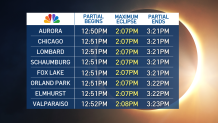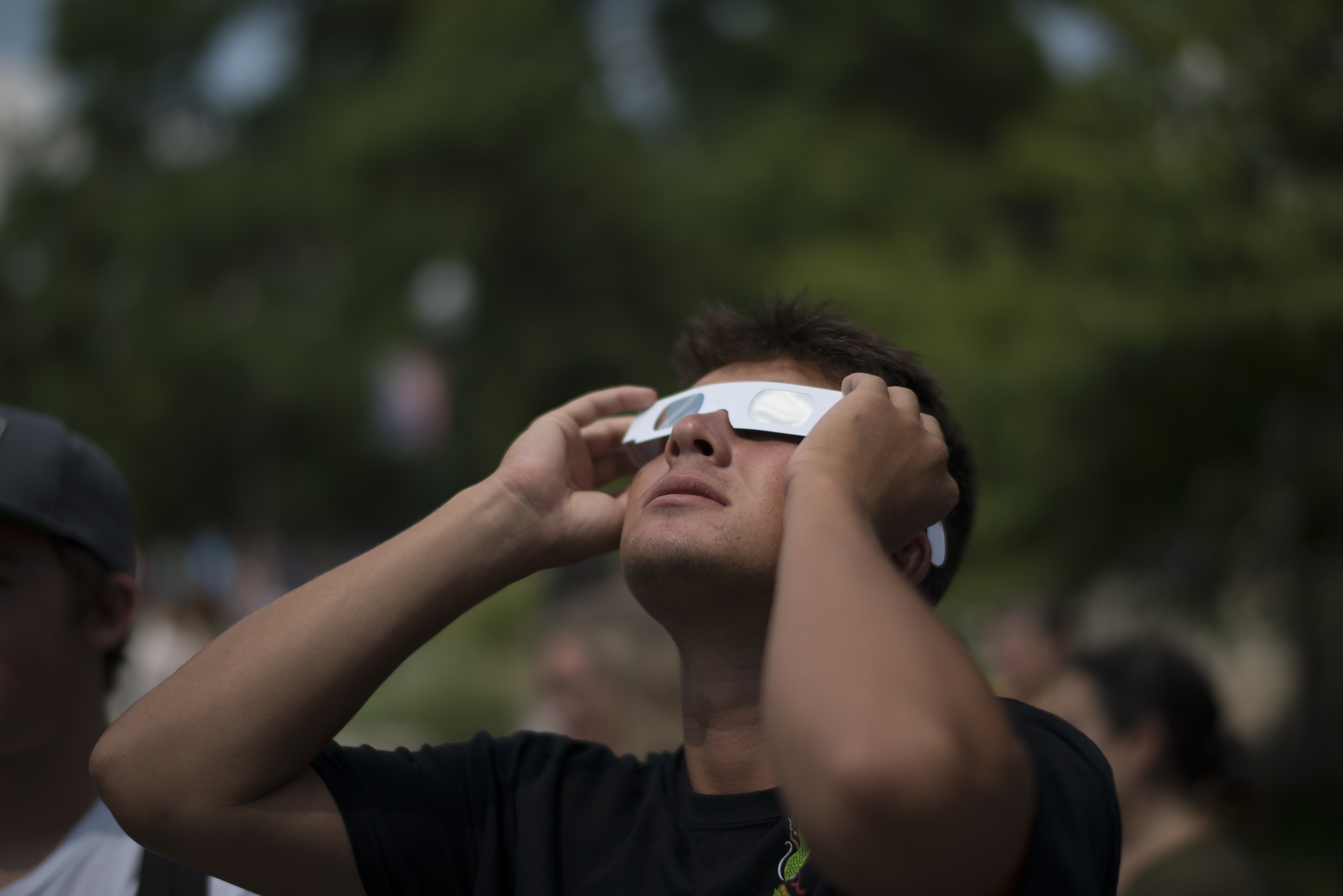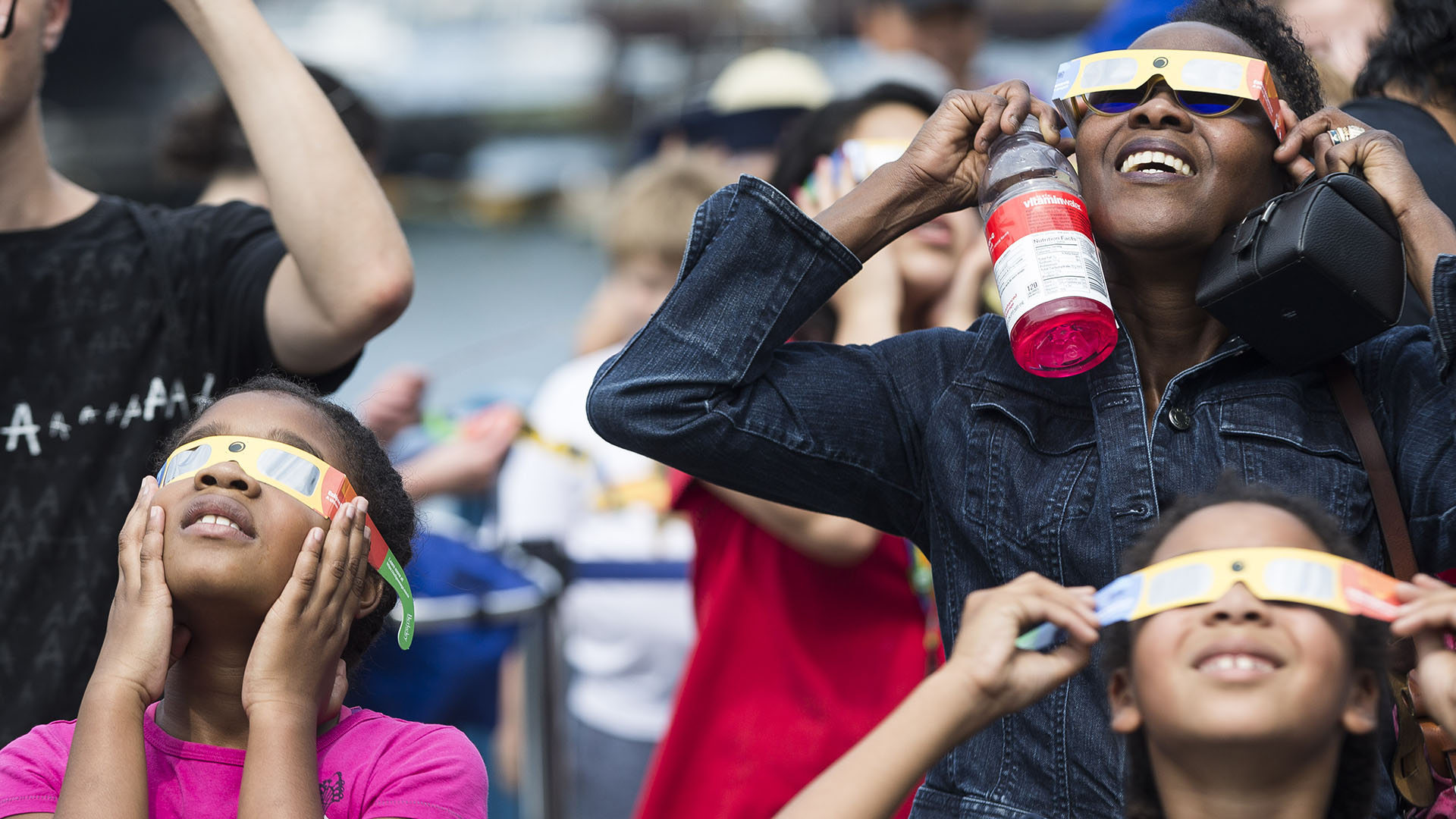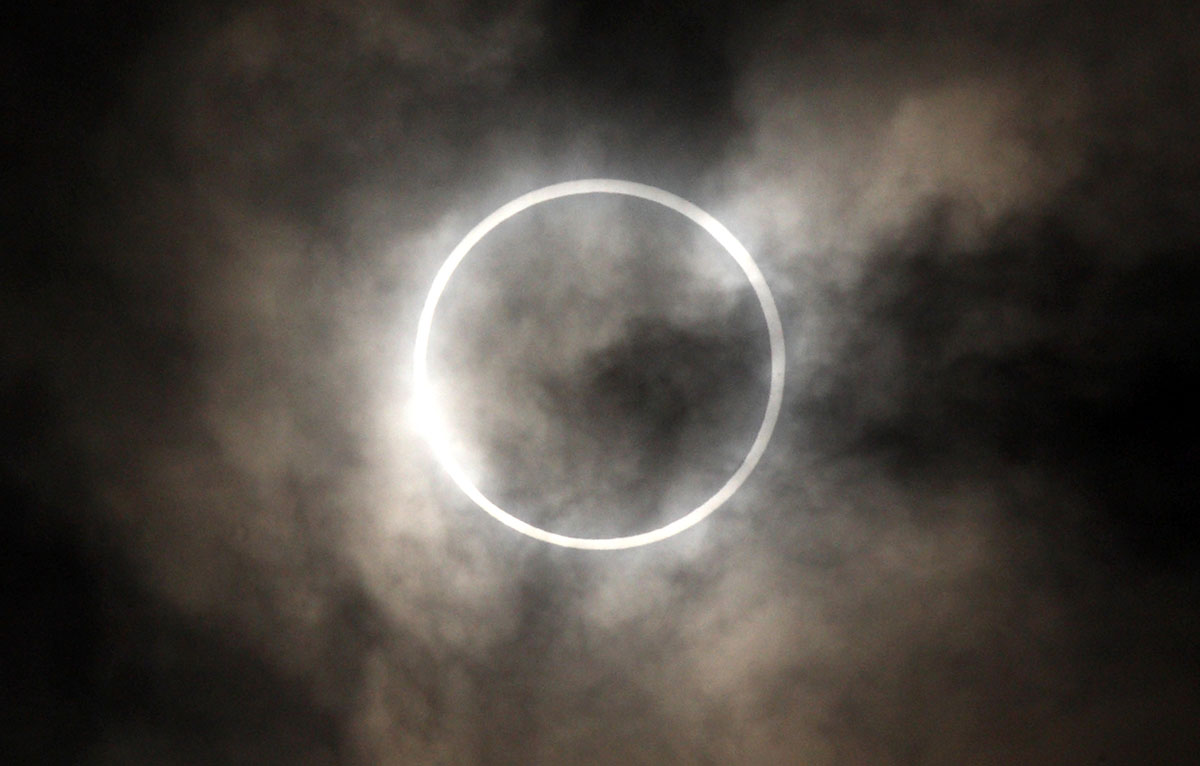What time will the 2024 total solar eclipse happen in Chicago and across Illinois?
The peak time for the April 8 eclipse -- along with what exactly you will see -- varies by location.
Some parts of Illinois, including Carbondale and surrounding cities, are in the so-called path of totality, meaning they will briefly see the sun completely covered by the moon, but for Chicago and its surrounding suburbs an estimated 94% totality is expected. That number is still higher than the eclipse in 2017 and even higher than any partial eclipses expected in the near future.
The rare astronomical phenomenon is taking place across a wide swath of the United States, marking what NBC 5 Storm Team Meteorologist Kevin Jeanes believes could be "the greatest solar eclipse across the U.S. in our lifetime."
According to NASA scientists, a total solar eclipse occurs when the new moon intersects the path of the sun in the sky, causing the sun to be partially and then nearly completely blocked from view.
In Carbondale, the largest Illinois city included in the path, totality will commence at approximately 1:59 p.m.
Assuming there are clear skies, stargazers there will be able to look at the eclipse without any aid whatsoever, with darkened skies and the famed “corona” blazing around the edges of the moon.
This period will last just a few minutes. Totality is expected to end at approximately 2:03 p.m. as the eclipse follows a diagonal line over Fairfeld and exits at Mount Carmel, according to state officials.
If you'll be in the Chicago area and won't be able to see the eclipse in totality, there is a silver lining. The partial eclipse will be visible for a while longer.
Feeling out of the loop? We'll catch you up on the Chicago news you need to know. Sign up for the weekly Chicago Catch-Up newsletter.
For areas outside of the path of totality, it will not be safe to view the eclipse without glasses or other tools.

Weather and cloud cover, however, could have an impact on what exactly you see and when. The forecast continues to change in the lead-up to the event.
According to the latest prediction from the National Weather Service, conditions appear to have cleared up for some parts of Illinois and Indiana, despite earlier potential for severe storms, but cloudy conditions linger for parts of northern Illinois and the Chicago area. Still, the NWS urges people to check back and "expect the forecast to change."
Here's a city-by-city breakdown of what to expect and when, according to Time and Date.
Aurora
Partial eclipse begins: 12:50:22
Maximum eclipse: 14:06:37
Partial eclipse ends: 15:21:07
Chicago
Partial eclipse begins: 12:51:28
Maximum eclipse: 14:07:41
Partial eclipse ends: 15:22:02
DeKalb
Partial eclipse begins: 12:50:03
Maximum eclipse: 14:06:09
Partial eclipse ends: 15:20:36
Evanston
Partial eclipse begins: 12:51:38
Maximum eclipse: 14:07:45
Partial eclipse ends: 15:22:00
Fox Lake
Partial eclipse begins: 12:51:29
Maximum eclipse: 14:07:20
Partial eclipse ends: 15:21:26
Lombard
Partial eclipse begins: 12:50:57
Maximum eclipse: 14:07:09
Partial eclipse ends: 15:21:33
Orland Park
Partial eclipse begins: 12:50:48
Maximum eclipse: 14:07:10
Partial eclipse ends: 15:21:42
Plainfield
Partial eclipse begins: 12:50:19
Maximum eclipse: 14:06:39
Partial eclipse ends: 15:21:14
Schaumburg
Partial eclipse begins: 12:51:05
Maximum eclipse: 14:07:10
Partial eclipse ends: 15:21:29
Wheaton
Partial eclipse begins: 12:50:48
Maximum eclipse: 14:07:00
Partial eclipse ends: 15:21:25
(Check your city here)
For those looking to be in the path of totality, here's a list of Illinois cities that fall in that category, according to the Illinois DNR:
Carbondale
Totality begins: 13:59:15
Maximum eclipse: 14:01:20
Totality ends: 14:03:25
Makanda
Totality begins: 13:59:09
Maximum eclipse: 14:01:14
Totality ends: 14:03:19
Alto Pass
Totality begins: 13:58:56
Maximum eclipse: 14:01:01
Totality ends: 14:03:06
Fairfield
Totality begins: 14:01:19
Maximum eclipse: 14:03:21
Totality ends: 14:05:23
Olney
Totality begins: 14:02:12
Maximum eclipse: 14:04:07
Totality ends: 14:06:03
Golconda
Totality begins: 14:00:39
Maximum eclipse: 14:02:04
Totality ends: 14:03:30
Effingham
Totality begins: 14:03:25
Maximum eclipse: 14:03:49
Totality ends: 14:04:13
Mt. Vernon
Totality begins: 14:00:35
Maximum eclipse: 14:02:28
Totality ends: 14:04:20
Marion
Totality begins: 14:01:53
Maximum eclipse: 14:03:54
Totality ends: 14:05:56




